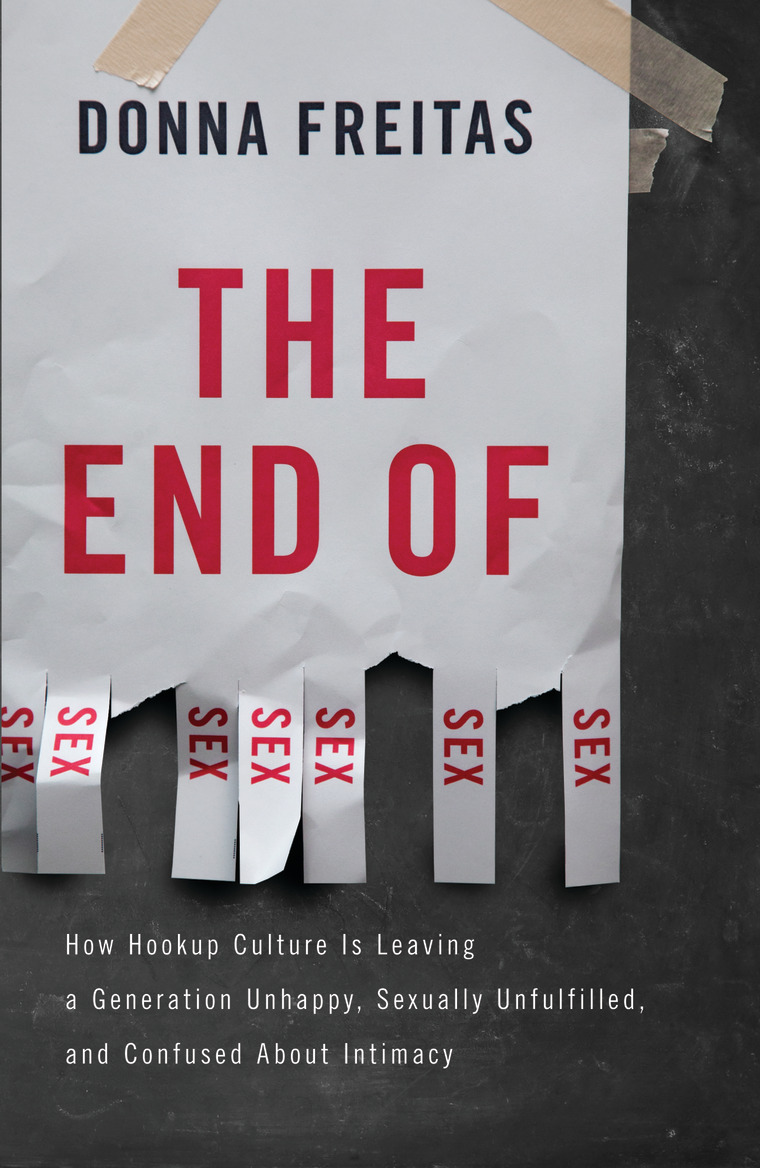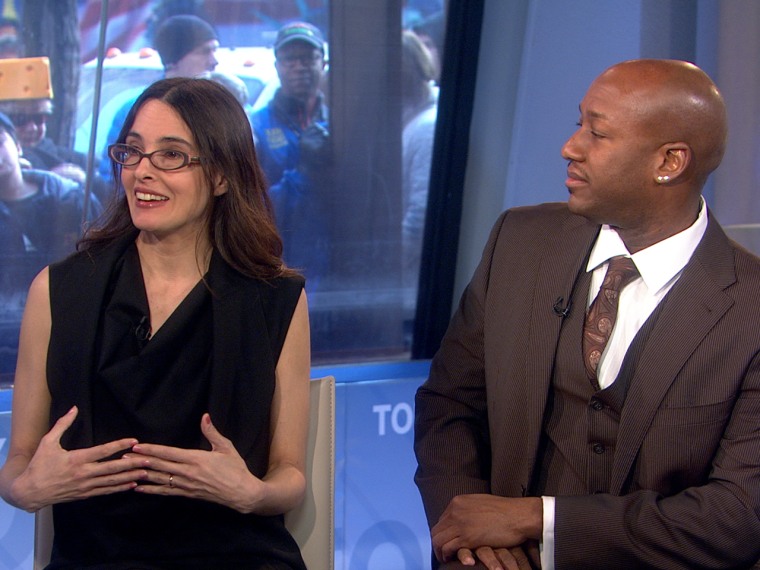In “The End of Sex,” Donna Freitas examines how in the current, feverish sexual climate where the hookup is all important, an entire generation has become completely adrift from the concepts of meaningful, emotional intimacy. Here's an excerpt.
Chapter One
Hookup World: The What, the Why, the How, the Classic vs. the Serial
Hooking up, I would say, is anything involving kissing, touching, feeling, or any kind of sexual activity. It could be as small as kissing someone for a few minutes, or as much as having sex with them.
—JUNIOR MAN AT A PRIVATE -SECULAR UNIVERSITY
That’s not okay, like, in Hookup World.
—JUNIOR WOMAN AT A PUBLIC UNIVERSITY
There are no strings. You just do it, you’re done, and you can forget about it.
—FIRST -YEAR WOMAN AT A CATHOLIC COLLEGE
Clearly, a “hookup” today is not about getting together to go to the movies. But it isn’t necessarily a one-night stand, either. So many of us make assumptions about the term “hooking up” because we have heard it batted around on television, read about it in newspapers and magazines, or overheard our children discussing it. We rarely stop our hand-wringing long enough to define our terms. What is a “hookup”? How does a sexual encounter qualify as one, and what makes it different from those that would not be considered in the same light?
Several articles that drew national attention gave the American public its first glimpses into hookup culture. In 2006, Caitlin Flanagan’s much-talked-about article on the topic in The Atlantic, “Are You There God? It’s Me, Monica,” set off alarm bells far and wide. Flanagan wrote about an alleged blow-job epidemic among teenagers and puzzled over why, given the so-called female empowerment we had achieved, girls had become so careless about their own behavior and pleasure and so focused on pleasing boys sexually. Then, in 2010, Flanagan took on hookup culture more directly with “Love, Actually,” an article, also appearing in The Atlantic, about how hookup culture was robbing girls of the “Boyfriend Story” they really wanted. She wondered how sexual liberation had come to be equated with the ability to endure a hookup. Her own under- standing of sexual liberation was something far more moderate and involved finding a middle road between sex equaling marriage, family, and domesticity, on the one hand, and sex equaling nothing at all, not even self-respect, on the other. Hookup culture not only robbed girls of the love story they really wanted, she said, it also robbed them of true sexual liberation.
Flanagan’s critique was spot on, yet she fell into the trap of assuming, like so many people, that hookup culture was a culture that served and was perpetuated by boys. This view leaves out a discussion of how boys feel about hookup culture. Also, like Hanna Rosin, who used anecdotal evidence to draw her conclusions, Flanagan failed to base her observations on rigorous data. Instead, she relied on personal reflection and news reports as “evidence” of what was going on with America’s teens and young adults.
In order to understand hookup culture, it is important to move past such alarmist public dialogue in order to grasp what such an encounter is, according to young adults who actually engage in the behavior. The only definitions that matter are those given to us by the kids who are hooking up. To find out what those definitions are, we must ask them.

“Hooking up can vary from a make-out session to having sex. . . . Then, with certain situations, you’ll know that it’s going to go further than that,” said one young woman I interviewed, a sophomore at a Catholic college. By “further,” she didn’t mean physically, but emotionally. During a hookup, if a person allows emotions to enter into the experience, he or she is betraying the social contract a hookup requires and will have to pay for this transgression. “That is where you set yourself up for heartache,” she said. “That is where that whole morning- after thing hurts.”
Another young woman, also a sophomore at a Catholic college, reiterated this belief. A hookup, as far as sexual intimacy goes, she said, is broadly understood to include just about every type of activity imaginable. “A good number of people under- stand hooking up as a Saturday night they made out with some- one. And that was that,” she said. “Then there are people who understand it as a Saturday night they had sex with someone. And that was that. . . . There’s no relationship, no strings attached. It’s not supposed to be something that either person dwells on. It’s not supposed to go anywhere.” For this young woman and for most of the students with whom I have spoken, the “anywhere” to which they are not supposed to go is a relationship, and the “something” on which they are not sup- posed to dwell is the sexual intimacy exchanged. Theoretically, everyone is supposed to be able to walk away from the experience as if it did not happen, because this is what the social contract asks of them.
Nor is hooking up a phenomenon just for the straight man or woman on campus. Gay and lesbian students are also caught up in hookup culture. One woman, a senior at a secular university who identified as queer, said that although she equated hooking up with kissing, she felt that for her friends and peers, “oral sex is maybe [the] most preferred” type of sexual content. A gay sophomore at a Catholic school said that for his peers, a hookup could be anything from one-time sex during a “one- night stand” to occasional sex, “depending on your definition of sex.” What defined a hookup more than the sex itself was the perception of its meaning (or lack thereof) by both participating parties. “It’s nothing serious, and not expected to last,” this sophomore stressed.
Other students had succinct descriptions of the hookup that were similar. A hookup is “one sexual encounter that has no commitment involved,” said a first-year man at a Catholic college. “It’s like you conquered something,” said a junior at a private-secular school. The object of conquest for this young man was not so much a woman but fulfillment of a social expectation. This is true for many young men, who both engage in the behavior and are often its primary instigators.
A senior woman at a private-secular institution told me that a hookup was “purely physical [and] emotionally unattached.” Another, at a private-secular university, said that a hookup “can run the gamut of any sexual activity . . . making out all the way to having sex.” And a sophomore man at a public university echoed this refrain, describing a hookup as “any sort of romantic or sexual moment between any two people.” He added, after a pause, that, “for some people, it’s just a sexual conquest.”
As for what people are supposed to get out of a hookup, the students were not always so certain: “sexual gratification,” said one young man from a private-secular school, although he later added that he wasn’t sure this was always, or even usually, the case, especially for the female parties involved.
Excerpted with permission from The End of Sex: How Hookup Culture Is Leaving a Generation Unhappy, Sexually Unfulfilled, and Confused About Intimacy, by Donna Freitas. Available from Basic Books, a member of The Perseus Books Group. Copyright © 2013.
